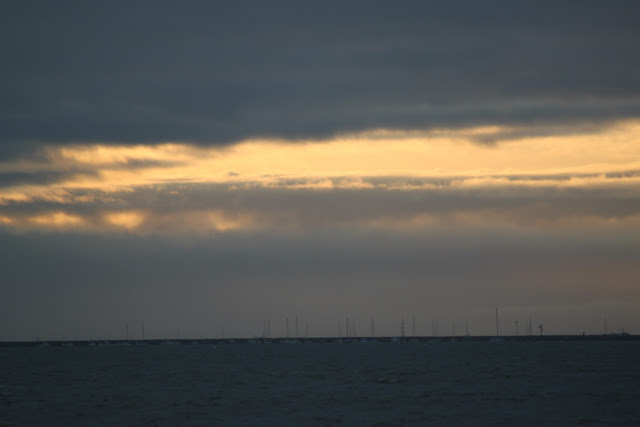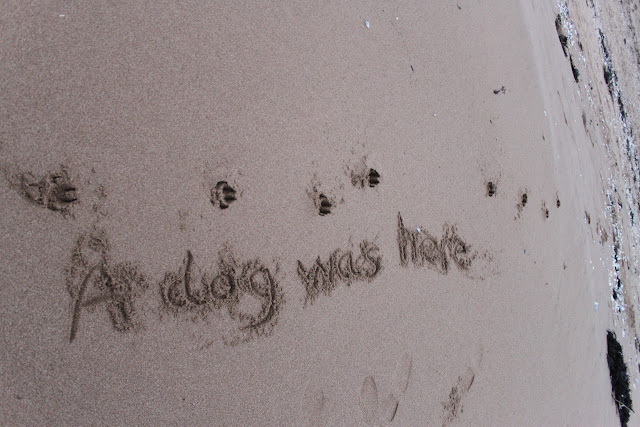Sunday, 29 January 2012
Rainbow warrior
My weekend, however boring, was dominated by one sight. This one:
I could thus sustain the buffets of a birthday party to which I shouldn't have gone, the long trip to and from there, the intense lack of sleep and the general solitude.
All in all, nothing a good, long walk along the strand couldn't fix. Tonight had not a remarkable sunset, but it had the no less remarkable quality of making me ponder. Thus could I rule out a plan of escape. I'm sticking to plan B then. I still have to make a couple of adjustments, but someone dear to me told me that someone dear to her told her that that was what life was all about. I'm not going to contradict this.
I wrote quite a lot this weekend, "a lot" is to be taken qualitatively. I also have come across another occurrence of a strange type of cross, which is popping out in odd places. I am digging yet further to the source. If need be, I'll post something about it, just in case someone somewhere knows something on the matter.
For now, I still have a good chunk of solitude to gnaw on.
Thursday, 26 January 2012
Wednesday, 25 January 2012
Tuesday, 24 January 2012
Vue panoramique de mon quotidien
Voici un lien pour voir le panorama en 360°
Merci Chab, experte dans l'art du découpage et du collage !
Monday, 23 January 2012
Time, that which he called the best counsellor, proved him right
"What
you leave behind is not what is engraved on stone momuments, but what
is woven into the lives of others."
Pericles,
Statesman, orator, general of Athens, promoter of the arts, culture
and literature (495 - 429 BC)
Sunday, 22 January 2012
Saturday, 21 January 2012
Friday, 20 January 2012
Ici
« Ton
ici est mon ailleurs, »
dit
le voyageur,
à
celle dont le cœur,
épris,
pleure.
Et
sur l'heure,
elle
sourit.
« Je
suis ici et ailleurs, »
dit-elle
sans pudeur,
à
celui qui vit,
sans
heurts,
là
où l'on meurt,
puis
revit.
« Voyageur,
je
te suis ici. »
Thursday, 19 January 2012
Perhaps I will be an enchanter too, one day.
"In a library we are surrounded by many hundreds of dear friends imprisoned by an enchanter in paper and leathern boxes."
Ralph Waldo Emerson, writer and philosopher (1803-1882)
Wednesday, 18 January 2012
Cathédrale St-Pierre-et-St-Paul de Nantes
Figure de la Justice, statue d'angle du tombeau de François II, dernier Duc de Bretagne, et de Marguerite de Foix, mère d'Anne de Bretagne

Figure de la Prudence. La tête du vieillard se situe à l'arrière de la tête de la statue. La Prudence tient un miroir pour mieux se connaître, le visage du vieillard symbolisant les années passées, la sagesse et l'expérience. Noter l'utilisation des cheveux pour faire la barbe...ou l'inverse.


Pas grand-chose sur cette stèle...des amateurs éclairés ?
Christ en croix déposé.
J'aime beaucoup l'escalier en colimaçon ajouré.
Les deux battants des portes. Des plaques rappellent les dates de décoration (et de pose ?) des portes: 1481
Ou comment se choper un cancer des poumons en faisant les poussières
The cathédrale.
A handful of opinions on solitude
"I owe my solitude to other people."
Alan Watts, British writer, philosopher and interpreter of Eastern philosophies (1915 - 1973)
"The worst solitude is to have no real friendships."
Francis Bacon (which one? Does anyone know? I lean towards the philosopher...but nothing's certain.)
"Writing is sweat and drudgery most of the time. And you have to love it in order to endure the solitude and the discipline."
Peter Benchley, American writer and father of Jaws (1940-2006)
"La tristesse vient de la solitude du coeur."
Charles-Louis de Secondat, baron de La Brède et de Montesquieu, moraliste, philosophe et écrivain (1689-1755)
Tuesday, 17 January 2012
Prayers
"I prayed for freedom for twenty years, but received no answer until I prayed with my legs."
Frederick Douglass, Former slave, abolitionist, editor, and orator (1817-1895)
Monday, 16 January 2012
How many times have I told my students that they could shape the OED?
"Language is not an abstract construction of the learned, or of dictionary makers, but is something arising out of the work, needs, ties, joys, affections, tastes, of long generations of humanity, and has its bases broad and low, close to the ground."
Noah Webster, lexicographer (1758-1843)
Sunday, 15 January 2012
Nyenasuma
Leaving
never is a more beautiful landscape than when the foot treads the
first acre of an unknown path. We discover ourselves under the rain
and the phosphorus, paying attention to the language of the wind. The
smell of the days of sunshine mottles our face, never to disappear.
Nyenasuma is etched inside of us, while we turn round to see
our footsteps carved in the sand.
We
seek wisdom in the salt of the lakes, and the nostalgia of the shrubs
catches up with us. We walk, because we do not want to do anything
else. Because we cannot do anything else. Because we do not know what
else to do. A stride cannot be etched into stone.
We
cross entire fields of women-trees erected by centuries of doom.
These are evil mothers, but they are bloodthirsty only because they
have been cursed. The child suckling on their breasts does not leave
any footprint in the snow, for the spider is posted at the fringe of
the mountains. As for us, we do nothing but take note of this natural
phenomenon, filling our gourds with fistfuls of snowflakes. Here is
the nyenasuma whom some call, with restraint and a slow gaze,
hiba hati.
There
is no frolicking here, for the falcon is on the lookout, and sharpens
its gaze on the edge of the mountains. Twining round balls of hair
which it mistook for the branches of a dwarf beech.
Once,
one of these women-trees was a young woman. She used to wear a green
felt coat, buttoned-up to the chin. She was carrying one of these
very discreet leather handbags. Every time a man sat in front of her
in the train, she used to present the oval of her face only. Averted
her eyes she always did, slowly. Even though she smiled. Ever so
faintly, right about enough for the men to notice it, but not enough
to carve a dimple in her cheeks. Yes, perhaps was she sad.
There
existed a sky devoid of aerial lines, but it is nowhere to be found
now. At present we have to leave, regardless of what appears in these
grey skies, grey with frost. We must leave this field of silence
before it becomes our sojourn. Our fate is to leave the beings to
theirs. And to walk as far as our heart allows it, before it turns to
stone so that it would best dwell somewhere it belongs, because it
will have elected this place in full knowledge of what is elsewhere,
which will henceforth bear the proud name of 'home'. Our gaze will,
then, shine with the things discovered, without hesitation, even if,
ultimately, it will, with an infinite slowness, stumble upon the
footprints in the sand and the trail of the falcon.
_______
Nyenasuma:
sadness, nostalgia (literally 'slow gaze') in Bambara (language
spoken in Mali, Burkina Faso, Côte d'Ivoire/Ivory Coast, Gambia,
Mauritania, Senegal)
Here is one of the paintings which, among others, inspired this poem:
Giovanni Segantini, Le Cattive Madri (The Evil Mothers), 1894
Subscribe to:
Comments (Atom)
Just a game
Some thoughts on Life as it seems to be, for us, all things considered, just a game. Indeed it has been likened to the most advanced video...
-
There's a thread on Facebook and all over the Internet that goes: "Shakespeare said: I always feel happy. You know why? Because I...
-
"Don't worry, for $99m, I've got all the time in the world." Auctioneer and Sotheby's head of modern art Tobias Me...
-
Mon weekend parisien, mis à part l'exposition "L'or des Incas" à la Pinacothèque , une petite expo sur Théodore Monod au...
















































